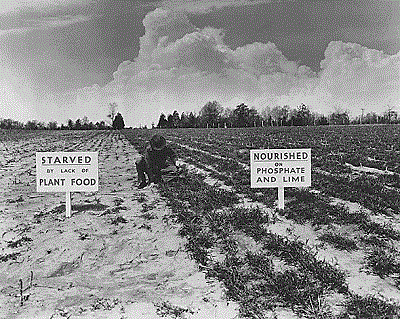Sustainable Food and Fiber Production through Soil
Soil provides food and fibers for us to eat, and clothes to wear. The biggest challenge for soil scientists involve the sustainable production of these items.
FOOD PRODUCTION

All life is dependent on soil for sustenance. There are over 10,000 edible species of plants. These plants acquire their minerals (nutrients) and water from the soil. Animals acquire their nutrients from plants. These provide humans with the minerals, vitamins, and proteins that they need to live. Soil is a reserve of nutrients, but it also is a complicated, living, materials. These living soil organisms are responsible for complicated transformations that are required to produce foods. The better the soils natural quality, the more food that can be produced. Areas like Iowa have super dark soils (called Mollisols), that have a ton of minerals and vitamins available, which is why they can get so much food per acre!

However, even the most dark, fertile soils require help to produce food. In nature, the plants take up nutrients, and when they die, the nutrients are recycled back into the environment. When we harvest crops and take them off of the field, we take the nutrients off of the field and eat them. This is called nutrient export. We need to make sure that the nutrients are put back onto the field, either with fertilizer, or manure. If we don't have enough, then we can't produce enough food to feed everyone.
The Soil Fertility page talks about which nutrients are important for plant production.

Rainfall is also really important. Some of the nutrients that plants need, including critical Nitrogen, move faster with rainfall. These are called Mobile Nutrients. They have an easier time moving in the soil to get to the plant, but they can easily be washed away in wet atmospheres. In warm, wet climates, the soil biology also acts faster, which can also remove nutrients, making it harder for people to grow crops without help. Other nutrients are immobile, and they stay more in the soil, but often rely on interesting relationships with fungi to get into the plant roots.
Some parts of the world are not as lucky when it comes to soil as others. Areas with Oxisols and Ultisols, like Africa, have very old soils. These soils don't have many natural nutrients left, and rely on fertilizers and manure to feed people. If people cannot afford these fertilizers, or ways to get water to plants, crops often die, and this can create famines.

Clothing
All clothing materials come from plants and animals soils. Leather, wool, and furs come from animals that humans have raised or hunted. Linen and cotton are woven together from plant fibers, and silk is created using the silkworm (animal) on a silk plant. Clothes that are made from polyester and other types of man made chemicals still come from natural products, like coal (which used to be soil) and petroleum, and still require the air and water filtered by soil and what grows in it.
Back to Soil and People



